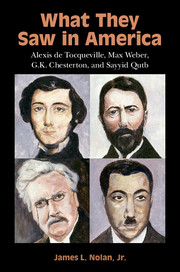Book contents
- Frontmatter
- Dedication
- Contents
- Acknowledgments
- Introduction
- 1 Pride, Patriotism, and the Mercantilist Spirit: Tocqueville and Beaumont Discover America
- 2 Tocqueville and the Quandary of American Democracy
- 3 Agrarianism, Race, and the End of Romanticism: Weber in Early Twentieth-Century America
- 4 Weber on Sects, Schools, and the Spirit of Capitalism
- 5 A New Martin Chuzzlewit: Chesterton on Main Street
- 6 Chestertonian Distributism and the Democratic Ideal
- 7 From Musha to New York: Qutb Encounters American Jahiliyya
- 8 Qutb's “Inquiring Eyes” in Colorado and California
- Conclusion
- Notes
- References
- Index
4 - Weber on Sects, Schools, and the Spirit of Capitalism
Published online by Cambridge University Press: 05 April 2016
- Frontmatter
- Dedication
- Contents
- Acknowledgments
- Introduction
- 1 Pride, Patriotism, and the Mercantilist Spirit: Tocqueville and Beaumont Discover America
- 2 Tocqueville and the Quandary of American Democracy
- 3 Agrarianism, Race, and the End of Romanticism: Weber in Early Twentieth-Century America
- 4 Weber on Sects, Schools, and the Spirit of Capitalism
- 5 A New Martin Chuzzlewit: Chesterton on Main Street
- 6 Chestertonian Distributism and the Democratic Ideal
- 7 From Musha to New York: Qutb Encounters American Jahiliyya
- 8 Qutb's “Inquiring Eyes” in Colorado and California
- Conclusion
- Notes
- References
- Index
Summary
After departing from Tuskegee, the Webers ventured north to visit relatives in Knoxville, Tennessee and Mt. Airy, North Carolina. Helene Weber was particularly keen to hear news of the so-called colonial children, that is, the grandchildren from her father's first marriage. Helene's father, Georg Frederick Fallenstein, and his first wife, Elizabeth Benecke, had six children, several of whom, when they came of age, moved to the New World. Among these was Fritz Fallenstein (aka Francis Miller or “Uncle Fritz”), Helene's half-brother, who “as an adolescent had left the despotic pressure of home and secretly escaped overseas.”
Francis himself had six children – these were the relatives the Webers visited in Knoxville and Mt. Airy in the fall of 1904. Max and Marianne already knew Bill Miller, whom they had hosted along with his father for a visit to Freiberg in 1895. Of the Miller children, Max and Marianne first stayed with Bill and his family for several days in Knoxville in early October, after which they traveled (by way of Asheville, North Carolina and a brief tour of the Biltmore estate) to Mt. Airy, where they spent several more days with other members of the Miller (Fallenstein) clan, including Jim and Jeff Miller. Picking up on themes he first explored in Tonawanda, New York, Weber, while visiting his American stepcousins, collected more data on Protestant sects and their relationship to modern capitalism.
Weber used several telling encounters from his time in the American West and South to illustrate the connections between membership in a Protestant sect and participation in the world of business, all of which he recounted in his 1906 essay, “Churches and Sects in North America.” The first of these was the story of a German nose specialist who had recently started a medical practice in Cincinnati. Upon receiving his first patient, the German doctor asked the man to explain “the nature of his complaint.” To the doctor's “considerable astonishment, the very first statement of the man was the announcement: I am from the Second Baptist Church on X street.” The “bewildered doctor” struggled to understand the “causal connection” between the patient's church membership and his “maladies of the nose.”
- Type
- Chapter
- Information
- What They Saw in AmericaAlexis de Tocqueville, Max Weber, G. K. Chesterton, and Sayyid Qutb, pp. 93 - 115Publisher: Cambridge University PressPrint publication year: 2016



